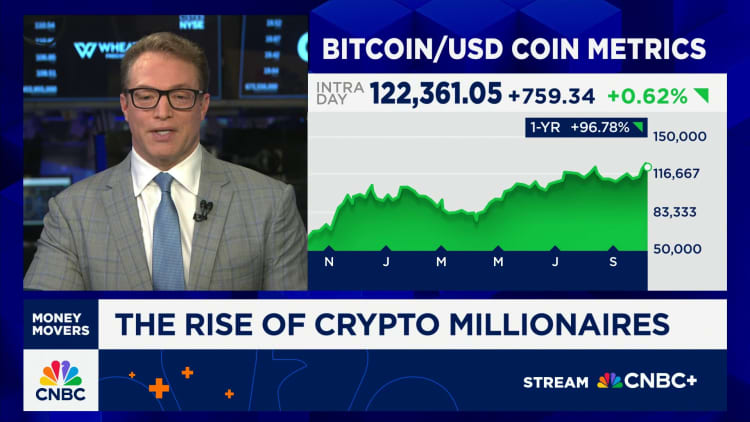Crypto Wealth Surges: 241,700 Millionaires Drive Economic Change

The rise in cryptocurrency values has led to a significant increase in the number of millionaires in this sector. Recent research indicates that there are now approximately 241,700 individuals globally whose crypto holdings exceed $1 million, marking a 40% increase from the previous year. This surge has the potential to inject hundreds of billions of dollars into the economy, according to analyses conducted by Henley & Partners and New World Wealth.
The cryptocurrency landscape has seen the emergence of 70,000 new crypto millionaires over the past year. As of now, the report identifies 450 crypto centimillionaires and 36 crypto billionaires. Bitcoin, the leading cryptocurrency, has more than doubled in value recently, partly due to inflationary pressures on the U.S. dollar and increasing investor interest driven by more favorable regulations and mainstream adoption by financial institutions.
On Monday, Bitcoin reached a record high of $125,000 before settling around $122,000. The total market capitalization of cryptocurrencies has soared to over $4.3 trillion, contributing approximately $2 trillion in paper wealth over the past three years. While this growth is still modest compared to the stock market, where companies like Nvidia are valued at more than $4 trillion, it has created substantial wealth, particularly for younger investors who entered the market early.
Philipp Baumann, founder of Z22 Technologies, emphasized that Bitcoin is evolving into a foundational currency for a new financial ecosystem. He stated, “Bitcoin is becoming the foundation of a parallel financial system, where it is not merely an investment for speculation on fiat price appreciation, but the base currency for accumulating wealth.”
Research into the spending habits of crypto investors remains limited due to the relatively recent emergence of this wealth class. Nonetheless, a study led by professors from Brigham Young University, including Darren Aiello, Mark Johnson, and Jason Kotter, alongside colleagues from various prestigious institutions, provides some insights. The researchers analyzed crypto wallet transactions and discovered that investors tend to spend approximately 9.7 cents for every dollar gained in crypto wealth. This spending rate is more than twice the typical rate observed with stock market or real estate gains.
The report estimates that the wealth generated from cryptocurrencies will lead to an additional $145 billion in spending in 2024, which accounts for around 0.7% of total U.S. consumption. Conversely, declines in cryptocurrency values could have the opposite effect, leading to reduced spending and potential economic strain.
The study categorizes crypto investors into two main groups: casual investors, who invest a relatively small portion of their wealth in cryptocurrencies, and “all-in” investors, who allocate their entire investment portfolio to this asset class. Interestingly, more diversified crypto investors tend to spend a larger portion of their gains, while those fully committed to cryptocurrencies maintain their spending levels, driven by strong beliefs in the asset’s future.
While high-profile purchases, such as luxury cars and watches, attract attention, the majority of crypto wealth is spent on everyday expenses, including dining and entertainment. Previous research indicated that real estate remains a popular investment for the crypto wealthy. In regions with significant crypto populations, home prices rise at a faster rate during Bitcoin price increases, with the study noting a growth rate of 0.46% faster in these areas.
Despite the current crypto boom, experts caution that immediate spending may not be as pronounced as expected. Tad Smith, former CEO of Sotheby’s and now a partner at 50T Funds, noted that many wealthy crypto investors are holding onto their assets in anticipation of further price increases. He remarked, “They want to be fully invested because this is the moment they’ve been waiting for. For them, this is not the time to sell.”
As these investors mature and begin families, their spending patterns are likely to shift. Smith observed that with responsibilities like children, many are inclined to invest in real estate rather than luxury items.
The spending habits of crypto investors may also experience a shift as financial products linked to cryptocurrency gain acceptance. Zac Prince, head of GalaxyOne, highlighted the challenges faced by wealthy crypto investors trying to secure mortgages, often due to the nature of their crypto assets. “Today if you want to borrow against your crypto, there are relatively limited options,” he explained.
However, the landscape may be changing. Bill Pulte, director of the Federal Housing Finance Agency (FHFA), recently directed Fannie Mae and Freddie Mac to consider cryptocurrency assets in their mortgage underwriting guidelines. As lenders begin to accommodate crypto assets, spending among the crypto wealthy is expected to increase, allowing them to access liquidity without selling their investments.
As the crypto market continues to evolve, the financial habits of its wealthy participants will likely shape not only their personal choices but also broader economic trends.






